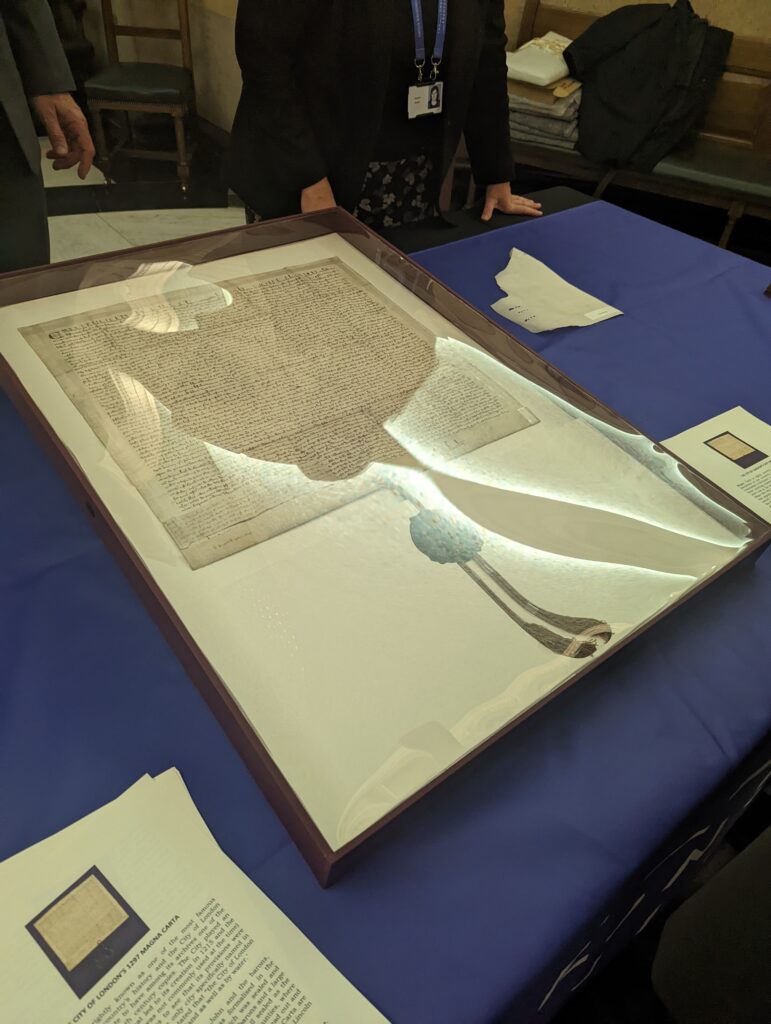810 years ago a miracle happened: a group of Barons restricted the King, a group of mere mortals restrained the quasi-divine, the rule of law limited absolute action – 810 years ago, Magna Carta was signed. On Thursday the 30th of October the Justice for All project held a celebration of twin anniversaries in order to begin the Justice For All lecture series. The event celebrated 800 years since the substantive 1225 Magna Carta, and 10 years since the United Nations Sustainable Development Goal 16 was announced: “Peace, Justice, and Strong Institutions”.

The keynote address and panel were bracketed by a kind of legal freshers fair, stalls abounded; there were groups of professional bodies, RAND, RBIJ, Serco – all commercial sponsors of the event; there were official representatives of criminal justice and the City of London – the Met, and the Sheriff and Recorder’s Fund, and the Old Bailey’s merchandise; the crown of all these stalls, and the one amassing the biggest crowd, was the London Archive’s display of the 1297 copy of Magna Carta – a beautiful, inscrutable, document at the heart of this and every legal event.
On paper at least, the event was designed to “examine transitions from Mediaeval Conflicts to Modern Mandates” – I can say for certain that the event began with a kind of Mediaeval pomp – sheltered by the awe-inspiring grand hall of the Old Bailey, the night was begun by the Sheriff of the City of London, Robert Hughes-Penney, and the Recorder of London, HHJ Mark Lucraft KC, of the three institutions established by Magna Carta, we began with the City of London.
The talks began with Robert Hughes-Penney extoling the virtues of the City of London, the Corporation that he has recently risen to the top of, and announcing the beginning of their Justice for All project, which this event was the grand opening ceremony of. Hughes-Penney proclaimed that the Justice For All talks would be a holistic look at contemporary Justice, this talk would stake out the status quo, where we begin with justice, and the coming talks will examine the relationship between justice and the accused, victims, survivors, prison leavers, and finance. One defining take-away is Robert’s argument that this programme will argue for the ‘economic sense’ of Justice For All, this makes sense for the audience – mostly the inheritors of the 13th century barons, mostly the wealthy and powerful, mostly those who could do something about our crumbling institutions.

Following Robert Hughes-Penney, the Recorder of London sketched a history, a history of the building we sat in, one that mirrored a history of the English Criminal Justice System, from private Newgate Prison, to the contemporary Central Criminal Court. The eagle eyed amongst you might notice a kind of paradox – here was the Chief Recorder decrying the conditions in the private Newgate Prison, before vast prison reform and public ownership transformed the building into the Old Bailey – right after the Sherriff had proclaimed the ‘economic sense’ of justice for all, right before the spokesperson for the private prison transporter Serco was due to speak. Perhaps the Chief Recorder’s comments were meant as a moment to marvel at the change the private sector has undergone in the some 100 years since the establishment of the Central Criminal Court.
After all these opening addresses came the centrepiece of the evening – a keynote speech from Lord Neuberger. Lord Neuberger’s keynote focused on the rule of law – in this context, Lord Neuberger stressed that he was discussing the fundamental, quasi-immortal concept of the rule of law, that of a society governed by the law and not by individual’s whims.

Lord Neuberger, like every other speaker, emphasised that any chance of a strong economy is predicated on a stable democratic society, which is itself dependent on the rule of law. One thing that immediately endeared Lord Neuberger was that he addressed the elephant in the room – why is this a celebration of 800 years of Magna Carta – why not 810 years? Didn’t King John sign on some rainy day of 1215? Well, herein lies one of the most important historical lessons of Magna Carta – it was not really the birth of democracy, it didn’t really usher in peace and harmony and a robust economy overnight, in fact the 1215 edition was almost immediately disowned by King John. Instead, Magna Carta was re-issued every so often when the peasants or Barons were a little too disquieted, even the ‘substantive’ version of 1225 was a mere step in a process that is still ongoing today, a process continued by the UN’s Sustainable Development Goal 16. A process that, for Lord Neuberger, was in danger of halting – if our mistreatment and underfunding of the criminal justice system continues.
Following Lord Neuberger’s rousing keynote, we were lucky enough to hear from 2024’s Nobel Prize in Economics winner Professor Simon Johnson. Where he continued the theme of a global process, from international anarchy to multinational institutional order. This theme continued into the panel discussion – a panel comprised of the Secretary General of the Commonwealth Magistrates’ and Judges’ Association, Dr Karen Brewer, the former Lord Chancellor, Rt. Hon. Alex Chalk, the current Bishop of Winchester, Rt. Rev. Phillip Mounstephen, and the CEO of RBIJ (the Responsible Business Initiative for Justice) Maha Jweied, all chaired by Caroline Haughey OBE, KC.
The panel was largely aimed at discussing and deliberating on the ideas raised by Lord Neuberger, especially focusing on the continued importance of the independence of the judiciary.

The fundamental message of the evening was, in the stark words of Maha Jweied, “we cannot take anything for granted” – the Rule of Law is the cornerstone of our society, of our government, of our legal system – but it can be undermined, it can be neglected, it can be reduced to rubble, it is up to us, the current and future generations of lawyers and legal workers, to ensure that in 2125 they will celebrate 900 years of the rule of law’s survival and not mourn its loss.
Iain Lynn is currently a Graduate Diploma in Law student, he has recently graduated from the University of St Andrews with a degree in Philosophy – whilst an undergraduate, he focused his journalistic eye on St Andrews’ theatre scene. He is working towards a career at the bar, whilst enjoying in his (now limited) free time, oil painting, stand-up comedy, and writing tortuously long essays on substack. He is a member of this year’s Lawbore/TL;DR Team.

